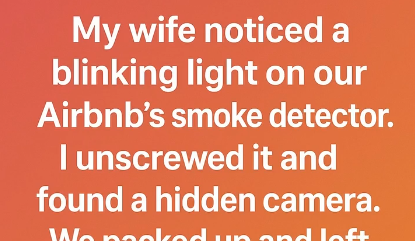My wife spotted a flashing light on the smoke detector in our Airbnb rental. Curious, I removed it and discovered what appeared to be a concealed camera. Pulse pounding, I revealed the find to her, and we swiftly gathered our possessions, departing in haste. Shocked by the experience, I composed a sharp critique during our drive away, urging others to steer clear of the property.
Moments later, my phone vibrated with a message from the host:
“You’ve misunderstood—this is a security measure. Kindly review your email for clarification.” Puzzled, I checked my inbox and found a thorough explanation. The host detailed how a prior guest had caused repeated damage and even tried to force entry afterward.
The “camera” I found wasn’t a camera at all—it was a blinking sensor tied to a home security system, designed to detect interference. The actual smoke detector remained fixed on the ceiling, while the device I’d tampered with was a cleverly disguised motion sensor, styled to blend into the decor.
Feeling sheepish, I sent an apologetic reply to the host. Graciously, they issued a refund for our stay and offered us a complimentary upgrade to another listing. My wife and I took away a valuable insight: fear and assumptions can easily distort reality. Now, we pause to gather all the facts before letting emotions guide our actions.









